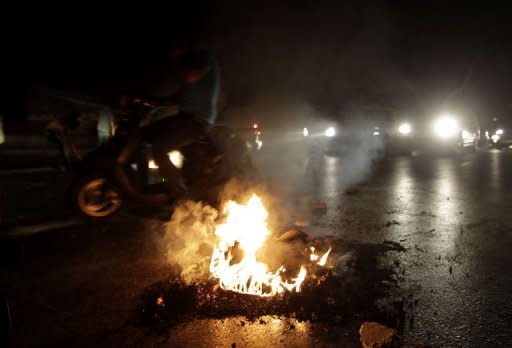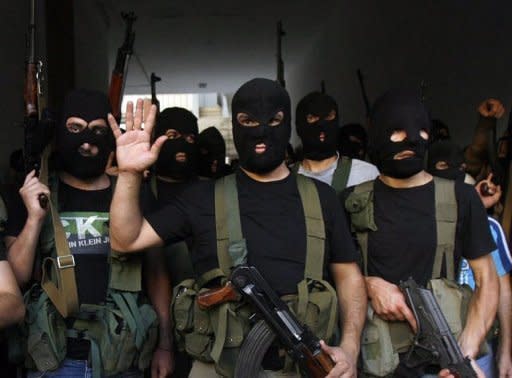Gulf states say stay away from Lebanon as violence erupts
Rioters blocked the road to Beirut airport, as dozens of Syrians were kidnapped and their shops vandalised in violence Wednesday that triggered orders from Gulf nations for citizens to leave Lebanon immediately. Rioters set fire to tyres on the road, while an Air France flight was diverted to Damascus for refuelling before flying on to Larnaca in Cyprus because of the insecurity, apparently triggered by unconfirmed reports over the fate of Lebanese pilgrims kidnapped in Syria in May. An Air France spokesman told AFP the flight had been diverted "as security conditions are not complete in Beirut," notably on the airport road. The plane only stayed in Syria long enough to refuel before flying to Larnaca, its final destination. Saudi Arabia, which is opposed to Syrian President Bashar al-Assad's regime, told its citizens to leave immediately after "clear threats against them," Lebanon's National News Agency said. The United Arab Emirates issued a similar warning, with Foreign Minister Sheikh Abdullah bin Zayed al-Nahayan tweeting: "Unfortunately, the situation is very dangerous," while Qatar followed suit. The warnings came as dozens of Syrians were reportedly kidnapped in Beirut, after unverified television reports claimed the Lebanese abducted in Syria in May were killed in Wednesday's air strike in the northern town of Aazaz. According to the Syrian Observatory for Human Rights, seven of the 11 pilgrims were wounded, but none was killed. "The relatives and neighbours of several Lebanese kidnapped in Syria took to the streets, and started to harass Syrians and vandalise their property in the area," NNA said. "Some of the attackers vandalised shops, destroyed cars for sale, and kidnapped dozens of Syrians," it said. "The situation has got out of control." Protesters also blocked off the main road linking Lebanon to Syria, an AFP correspondent said. Lebanon is one of Gulf tourists' favourite destinations during the summer, as they seek to escape their searing hot climate for the cooler Mediterranean climate and the more liberal lifestyle. But violence in Syria has spilled over into Lebanon, denting the country's already fragile security situation, with cross-border shootings, shelling by the Syrian army, tit-for-tat kidnappings and sectarian clashes between groups which are divided over the revolt. The United States voiced support for efforts by Lebanese authorities to maintain calm and said it was not following the action taken by Gulf states. "Our concern in Lebanon, first and foremost, has been the spillover from the Syrian conflict and the fact that the sectarian tensions in Syria are potentially being replicated in Lebanon," State Department spokeswoman Victoria Nuland told reporters. "We have done the appropriate travel warnings," she said. "We haven't gone as far as the Saudis have." In a related incident, the spokesman of a Shiite Lebanese clan said it had kidnapped 33 Syrians in Beirut and the eastern Bekaa valley, including a rebel Free Syrian Army captain, and a Turkish man. Hatem al-Muqdad said the action was aimed at securing the release of a relative kidnapped in Syria on Tuesday. "Tomorrow the number may rise to 50, because it is the only way to save the life of Hassan," he said. "And those who ordered his kidnapping will pay dearly." At least one Syrian was also kidnapped in Al-Minya, north of the port city of Tripoli, an opposition source told AFP. Syria's main opposition coalition condemned the kidnappings. "The Syrian National Council expresses its deep dismay at the kidnapping of a large number of Syrian citizens, who had fled to Lebanon to take refuge from bloody oppression in their country," it said in a statement. Lebanon's sectarian make-up has Shiites mainly supporting Assad's regime, and Sunnis supporting the insurgents. Syrian activists in Lebanon called via Facebook on fellow Syrians who fled the bloodshed for what should have been a safer haven to "stay home," and to "avoid areas where violence could break out." Syria occupied Lebanon militarily and politically for nearly three decades until 2005, when its troops were forced to pull out under international pressure after the assassination of former Lebanese premier Rafiq Hariri that year. Seven years after Syria withdrew from Lebanon, the country's political forces remain sharply divided over events in their neighbour.





